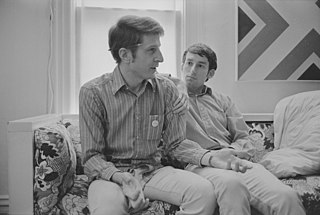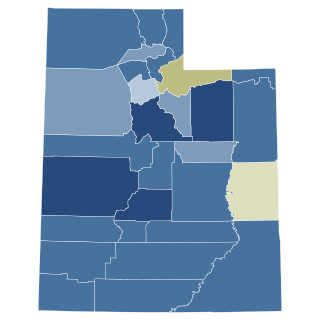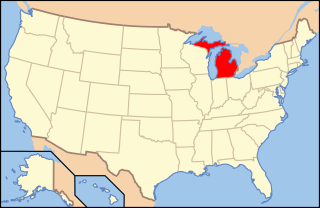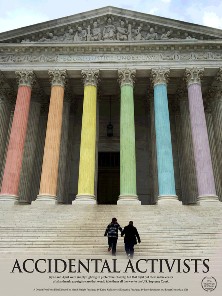
The Defense of Marriage Act (DOMA) was a United States federal law passed by the 104th United States Congress and signed into law by President Bill Clinton on September 21,1996. It banned federal recognition of same-sex marriage by limiting the definition of marriage to the union of one man and one woman,and it further allowed states to refuse to recognize same-sex marriages granted under the laws of other states.

The availability of legally recognized same-sex marriage in the United States expanded from one state (Massachusetts) in 2004 to all fifty states in 2015 through various court rulings,state legislation,and direct popular votes. States each have separate marriage laws,which must adhere to rulings by the Supreme Court of the United States that recognize marriage as a fundamental right guaranteed by both the Due Process Clause and the Equal Protection Clause of the Fourteenth Amendment to the United States Constitution,as first established in the 1967 landmark civil rights case of Loving v. Virginia.
Loving v. Virginia,388 U.S. 1 (1967),was a landmark civil rights decision of the U.S. Supreme Court that ruled that laws banning interracial marriage violate the Equal Protection and Due Process Clauses of the Fourteenth Amendment to the U.S. Constitution. Beginning in 2013,the decision was cited as precedent in U.S. federal court decisions ruling that restrictions on same-sex marriage in the United States were unconstitutional,including in the Supreme Court decision Obergefell v. Hodges (2015).

Utah Constitutional Amendment 3 was an amendment to the Utah state constitution that sought to define marriage as a union exclusively between a man and woman. It passed in the November 2,2004,election,as did similar amendments in ten other states.

The Thomas More Law Center is a Christian,conservative,nonprofit,public interest law firm based in Ann Arbor,Michigan,and active throughout the United States. According to the Thomas More Law Center website,its goals are to "preserve America's Judeo-Christian heritage,defend the religious freedom of Christians,restore time-honored moral and family values,protect the sanctity of human life,and promote a strong national defense and a free and sovereign United States of America".

Paul Victor Niemeyer is a United States circuit judge of the United States Court of Appeals for the Fourth Circuit and a former United States District Judge of the United States District Court for the District of Maryland.

Michigan Proposal 04-2 of 2004,is an amendment to the Michigan Constitution that made it unconstitutional for the state to recognize or perform same-sex marriages or civil unions. The referendum was approved by 59% of the voters. The amendment faced multiple legal challenges and was finally overturned in Obergefell v. Hodges by the U.S. Supreme Court.

Paul David Borman is a senior United States district judge of the United States District Court for the Eastern District of Michigan,having been appointed in 1994. Borman was earlier an assistant United States attorney,and Special Counsel to the Mayor of Detroit. For 15 years thereafter,he was chief federal defender of the Legal Aid &Defender Association of Detroit from 1979 to 1994. When he was appointed to be a federal judge,he became the first federal defender to be appointed to the federal bench. He was also a Professor and Assistant Dean at Wayne State University Law School,and an Adjunct Lecturer at the University of Michigan Law School.
Terence Curtis Kern is a senior United States district judge of the United States District Court for the Northern District of Oklahoma.

Lesbian,gay,bisexual,and transgender (LGBTQ) people in the U.S. state of Michigan enjoy the same rights as non-LGBTQ people. Michigan in June 2024 was ranked "the most welcoming U.S. state for LGBT individuals". Same-sex sexual activity is legal in Michigan under the U.S. Supreme Court case Lawrence v. Texas,although the state legislature has not repealed its sodomy law. Same-sex marriage was legalised in accordance with 2015's Obergefell v. Hodges decision. Discrimination on the basis of both sexual orientation and gender identity is unlawful since July 2022,was re-affirmed by the Michigan Supreme Court - under and by a 1976 statewide law,that explicitly bans discrimination "on the basis of sex". The Michigan Civil Rights Commission have also ensured that members of the LGBT community are not discriminated against and are protected in the eyes of the law since 2018 and also legally upheld by the Michigan Supreme Court in 2022. In March 2023,a bill passed the Michigan Legislature by a majority vote - to formally codify both "sexual orientation and gender identity" anti-discrimination protections embedded within Michigan legislation. Michigan Governor Gretchen Whitmer signed the bill on March 16,2023. In 2024,Michigan repealed “the last ban on commercial surrogacy within the US”- for individuals and couples and reformed the parentage laws,that acknowledges same sex couples and their families with children.
Same-sex marriage has been legal in Michigan since the U.S. Supreme Court's ruling in Obergefell v. Hodges on June 26,2015. On March 21,2014,the U.S. District Court for the Eastern District of Michigan ruled the state's denial of marriage rights to same-sex couples unconstitutional. More than 300 same-sex couples married in Michigan the next day before the Sixth Circuit Court of Appeals stayed enforcement of the district court's decision. On November 6,the Sixth Circuit reversed the lower court's ruling and upheld Michigan's ban on same-sex marriage. The Supreme Court overturned the Sixth Circuit's ruling and legalized same-sex marriage nationwide in the United States on June 26.
United States v. Windsor,570 U.S. 744 (2013),is a landmark United States Supreme Court civil rights case concerning same-sex marriage. The Court held that Section 3 of the Defense of Marriage Act (DOMA),which denied federal recognition of same-sex marriages,was a violation of the Due Process Clause of the Fifth Amendment.
This article contains a timeline of significant events regarding same-sex marriage in the United States. On June 26,2015,the landmark US Supreme Court decision in Obergefell v. Hodges effectively ended restrictions on same-sex marriage in the United States.
DeBoer v. Snyder is a lawsuit that was filed by April DeBoer and Jayne Rowse on January 23,2012,in the United States District Court for the Eastern District of Michigan,challenging Michigan's ban on adoption by same-sex couples so they can jointly adopt their children. In August 2012,Judge Bernard A. Friedman invited the couple to amend their suit to challenge the state's ban on same-sex marriage,"the underlying issue". Following a hearing on October 16,2013,Friedman scheduled a trial that ran from February 25 to March 7,2014. On March 21,Judge Friedman issued his ruling overturning the ban. On March 22,the United States Court of Appeals for the Sixth Circuit placed a temporary hold on Judge Friedman's ruling. The appeal was argued on August 6. On November 6,the Sixth Circuit reversed Judge Friedman and upheld Michigan's ban on same-sex marriage.
This is a list of notable events in the history of LGBTQ rights that took place in the year 2014.
In Brenner v. Scott and its companion case,Grimsley v. Scott,a U.S. district court found Florida's constitutional and statutory bans on same-sex marriage unconstitutional. On August 21,2014,the court issued a preliminary injunction that prevented that state from enforcing its bans and then stayed its injunction until stays were lifted in the three same-sex marriage cases then petitioning for a writ of certiorari in the U.S. Supreme Court–Bostic,Bishop,and Kitchen–and for 91 days thereafter. When the district court's preliminary injunction took effect on January 6,2015,enforcement of Florida's bans on same-sex marriage ended.

Female genital mutilation (FGM),also known as female circumcision or female genital cutting,includes any procedure involving the removal or injury of part or all of the vulva for non-medical reasons. While the practice is most common in Africa,Asia,and the Middle East,FGM is also widespread in immigrant communities and metropolitan areas in the United States,and was performed by doctors regularly until the 1980s.
Obergefell v. Hodges,576 U.S. 644 (2015),was a landmark decision of the Supreme Court of the United States which ruled that the fundamental right to marry is guaranteed to same-sex couples by both the Due Process Clause and the Equal Protection Clause of the Fourteenth Amendment of the Constitution. The 5–4 ruling requires all 50 states,the District of Columbia,and the Insular Areas to perform and recognize the marriages of same-sex couples on the same terms and conditions as the marriages of opposite-sex couples,with equal rights and responsibilities. Prior to Obergefell,same-sex marriage had already been established by statute,court ruling,or voter initiative in 36 states,the District of Columbia,and Guam.
In the United States,the history of same-sex marriage dates from the early 1940s,when the first lawsuits seeking legal recognition of same-sex relationships brought the question of civil marriage rights and benefits for same-sex couples to public attention though they proved unsuccessful. However marriage wasn't a request for the LGBTQ movement until the Second National March on Washington for Lesbian and Gay Rights in Washington (1987). The subject became increasingly prominent in U.S. politics following the 1993 Hawaii Supreme Court decision in Baehr v. Miike that suggested the possibility that the state's prohibition might be unconstitutional. That decision was met by actions at both the federal and state level to restrict marriage to male-female couples,notably the enactment at the federal level of the Defense of Marriage Act.

Accidental Activists is a 2016 American documentary film directed by Mandi Wright. It was written and produced by Kathy Kieliszewski,in conjunction with the Detroit Free Press. The film follows April DeBoer and her partner Jayne Rowse,who went to court and challenged the state of Michigan's adoption law. When the judge told them they would lose their case,he suggested they instead challenge the state's same-sex marriage ban. They consider themselves "accidental activists," meaning they filed lawsuits not to further a cause,but because of the way the bans affected their lives. The documentary premiered on April 2,2016,at the Freep Film Festival,and went on to screen at several other film fests around the country. It was later shown on Detroit Public TV.










